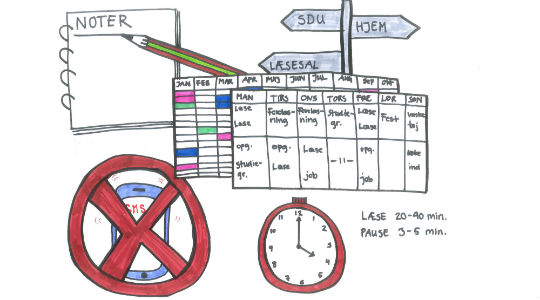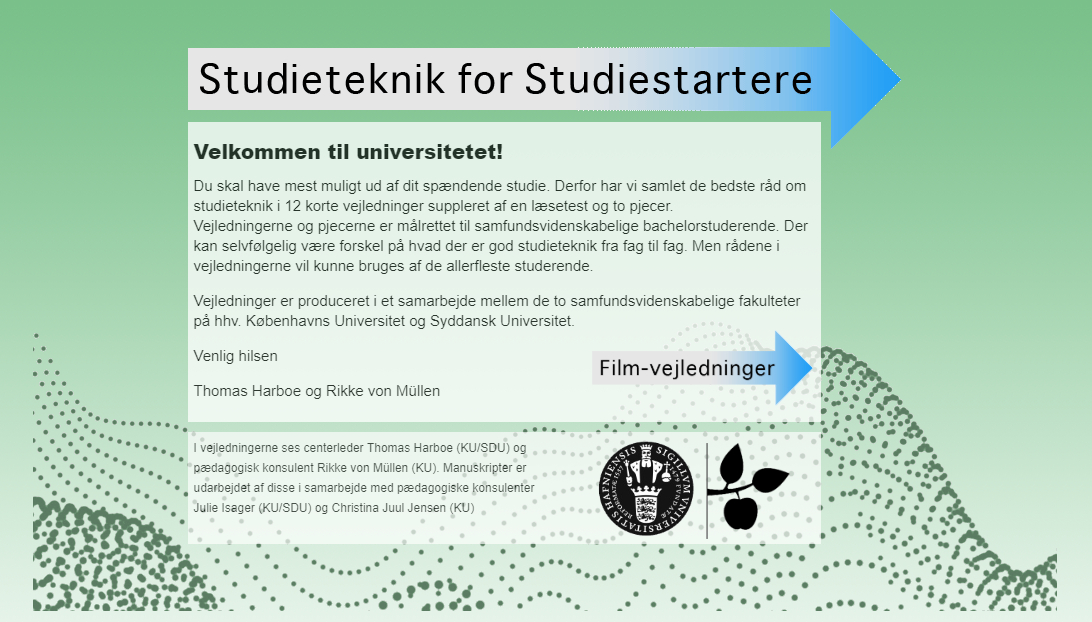
Do you work optimally?
Before looking at study techniques, it is worth asking yourself some basic questions about your way of working with your studies:
- Where do you study?
- When do you study?
- With whom do you study?
- How do you study?
- Is it the best way?
The fundamentals must be in place
It matters where, how and with whom you work with your study. For example, it may be tempting to read texts while lying in your bed. But the risk that you get tired and give up halfway through the text, is much bigger if you for example lie in bed than if you sit at a desk.
Think about what good fundamentals are for getting the work done. It can be very individual. You must find your own way.
Goals and intermediate goals
If you want to get the most out of your studies, you must set some goals for what you want to achieve with your subjects, your semester or the entire duration of your study. However, it can be a long way to the final goal, and therefore it can be good both for your motivation and overview, if you set some intermediate goals on the way to the final goal. Then you make sure that you always know what to do.
Work with your goals
It only makes sense to set goals and intermediate goals if you can use these goals as an aim for your work. Therefore, it is important that your goals are realistic, specific and timed. By setting specific goals, you can better find out how many resources you must devote to the individual intermediate goals. This means, for example, that you must consider how long you will spend on each exam.
Have bio breaks
Most have experienced reading the same sentence several times, or not being able to remember what one has read when the text is read to end. These are all signs that your concentration is exhausted, and you need a break. There are several ways to hold pauses. Some find that they have automatically signed in to Facebook or are reading emails. However, this is not a good way for your brain to pause, postpone it until the evening. The brain benefits from bio breaks. Bio breaks are breaks where you do something with your body. The short bio breaks may be that you go out and get a glass of water, eat an apple or go out and empty the mailbox.
Keep your breaks short
If you keep short breaks of approx. five minutes, you do not have to spend time getting back into the text when you start working again, since you have only been away from it a short time. The short break, however, allows the brain to recover. You will therefore find yourself concentrating better and working longer if you work at shorter intervals (about 25 minutes) interrupted by five-minute breaks.
Use a calendar
To get an overview of how you best structure your days, you can make a detailed schedule of what to do when. For example, you can use a calendar that you fill in with relevant deadlines, assignments and exam dates. You must also fill in everything that is not related to the study program, but that still takes your time, e.g. birthdays, holidays etc.Remember that the calendar should not act as a tool to remember but as a planning tool. This means that you must look ahead in the calendar and find out which periods it will make sense to concentrate on specific tasks.
Use a weekly plan
You can fill out a weekly plan [link til ugeplan] if you feel it is difficult to get it done, when you set yourself up for something. Fill in the weekly plan with all your regular appointments during the next week, e.g. teaching, study group work, sports, family visits, etc. Then insert the time you would like to spend on your reading and assignments. Think carefully about which times you are most obvious and get the most out of reading. When you have filled in the plan you know exactly when you must work and when you are off. Make sure to fill in pauses so that the plan becomes realistic.
Videoes and leaflets about Study skills
